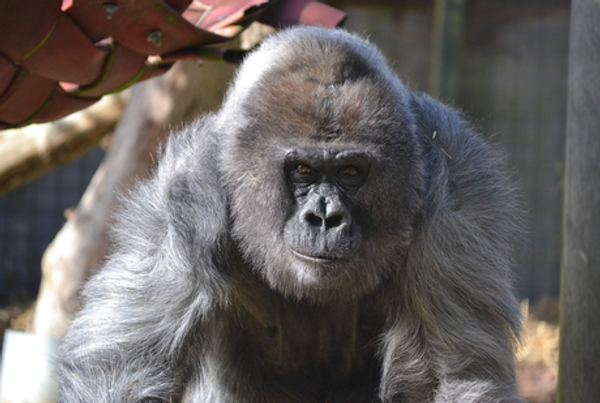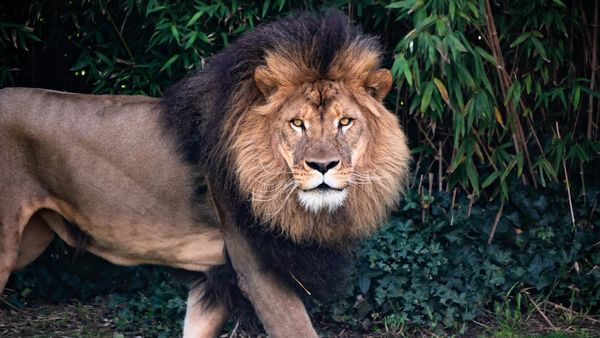SAN DIEGO -- With all families, there comes a time when children reach a certain age and have to move out on their own.
Frank and Monroe were at that age, and things were getting a little uncomfortable at home. They moved out Dec. 6 and are sharing a bachelor pad not far from their family.
The pair are western lowland gorillas, and they seem to feel at home in their new habitat at the San Diego Zoo's Safari Park in Escondido, said senior wildlife care specialist Breanne Murray.
"You see them kind of battling, but in a very positive way," she said. "And we're seeing a lot of play out of them."
For much of their lives, Frank and Monroe had been living at the park in a gorilla troop led by silverback gorilla Winston, 50. Frank, 14, was born at the San Diego Zoo and moved to the Safari Park when he was 5 to bond with Monroe, who was born at the park 11 years ago and is the son of Winston and Kokomo.
As the Safari Park's wildlife care director, Kristi Burtis, explains, troops have only one silverback, the name for breeding gorillas that have reached sexual maturity. In the wild, young males usually venture out on their own when they approach sexual maturity around 9 or 10 years old. They sometimes will form bachelor troops with other male gorillas their age, and around 15 they develop a silver section on their backs.
The young gorillas may continue to live solitary lives for years, but over time they may try to form their own family troop. Sometimes female gorillas may leave their troops to start a new family with a bachelor that has been following their troop, or a bachelor may take over a troop where a silverback has died.
According to The Gorilla Organization, aggressive troop takeovers by a bachelor gorilla almost never happen.
Frank and Monroe probably will not have to work as hard to have their own family troops. The San Diego Zoo Wildlife Alliance is one of 51 members of the Gorilla Species Survival Plan, and Frank and Monroe some day may be sent to another zoo that needs a breeding silverback.
"Around 47 percent of gorillas are males, and not every one will become silverbacks that have the potential to breed," Burtis said. "But that is our hope, to find situations where we can place silverbacks with females."
The program also works to ensure genetic diversity around zoos to help the endangered species survive, she added.
Wildlife specialists at the Safari Park knew it was time to make a change at the troop led by Winston.
"Monroe was starting to challenge the females, and Frank started to challenge Winston to the point we were no longer comfortable," Burtis said.
Park personnel about nine months ago began making modifications to a 3-acre area available for a new habitat for the two gorillas. Over that time, wildlife specialists also began working with Frank and Monroe so the move would not be traumatic.
Burtis said wildlife specialists got the two gorillas comfortable with the move through operant conditioning based on the work of B.F. Skinner.
"Everything we do here with the animals is only based on positive rewards," she said, explaining how carrots, tomatoes and sometimes even smoothies were used as rewards to encourage certain behavior.
The gorillas became used to being transported first by becoming comfortable with going inside a crate that was lifted onto a vehicle.
"All of this was done under stimulus control, meaning they had choice to go into the unit," Burtis said. "And it's a step-by-step process. They literally would go into the transport unit while the wildlife care specialist would roll them out, reinforce them and roll them back in. You'd think, 'My God, that takes a long time.' It does."
To make them even more comfortable with the process, the gorillas were taught to push the button that controlled the device that lifted their crate to be rolled onto the truck. Once on the truck, the gorillas were taken on short rides that led to their last one to their new home.
"We'd drive them down the driveway, then drive them back, off load them and put them back in the house," Burtis said, explaining the dry runs that were made back and forth from the troop's habitat.
On Dec. 6, they made their final trip, which took about six minutes. They cannot smell or hear gorillas in Winston's troop from their new habitat.
The bachelor troop is in a location not accessible to most park visitors but can be seen by guests who book a Wildlife Safari tour, which is $89 a person and takes 15 guests on a ride that includes up-close opportunities and some behind-the-scenes areas.
Burtis said the park has plans to create a more natural structure for the two gorillas to climb in the future, and they also hope to organize other opportunities for guests to see the habitat and learn more about the Gorilla Species Survival Plan.
Murray said the two appear to be more calm than they had been while with Winston's troop and are enjoying the large habitat.
On one recent damp morning, she noticed Frank dragging a burlap sack that he has taken to walking on to keep his feet dry.
"We call that his Frankie blankie," she said.
____










